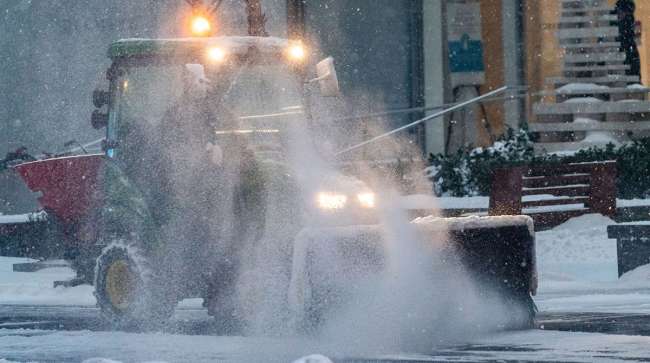Staff Reporter
Freight Operations Resume in Snow-Smothered Northeast States

[Stay on top of transportation news: Get TTNews in your inbox.]
Freight operations in the Northeast are proceeding after a massive snowstorm walloped the region, resulting in temporary restrictions on commercial vehicle travel.
Leaders in several states established truck travel restrictions as a Nor’easter moved in Feb. 1. According to the National Weather Service, the storm dumped 17.4 inches of snow in New York City, 16.6 inches in Norfolk, Conn., and 14.5 inches in Scranton, Pa.
Rhode Island Trucking Association President Christopher Maxwell expressed frustration with the state’s travel restriction, noting snow had not accumulated in his area by late morning Feb. 1. Rhode Island’s ban prohibited all tractor-trailers, except those carrying emergency supplies, from traveling on state roadways. Rhode Island Department of Transportation spokesman Charles St. Martin confirmed the restrictions were lifted Feb. 2 at 5 a.m.
The ban on tractor trailers has been lifted as of 5 a.m. this morning. — RIDOTNews (@RIDOTNews) February 2, 2021
“The effect was a lost day of production after an overly aggressive and premature action by state leaders who unnecessarily disrupted our supply chain,” Maxwell told Transport Topics. “No challenges or danger existed at any point during storm. Leaders mean well in the name of safety, but far more thought and restraint needs to go into these decisions.”
Rhode Island Gov. Gina Raimondo’s proclamation of emergency pertaining to the state’s roadways indicated leaders were seeking to prevent accidents involving trucks and minimize impediments to snow plowing activities.
Pennsylvania Motor Truck Association spokesman Brandon Moree confirmed that the state’s truck travel restrictions had been lifted as of Feb. 3. Moree noted the roads he encountered Feb. 3 were in “fine condition,” and said PMTA members generally plan accordingly to avoid travel when weather conditions are bad.
Vehicle restrictions have been lifted in many areas of the state, but several roadways in Northeast Pennsylvania still have restrictions in place.
We're still urging motorists to avoid non-essential travel.
See the latest roadway info at https://t.co/uKuZOUFmHi. pic.twitter.com/gAvXXhKfKP — PA Department of Transportation (@PennDOTNews) February 2, 2021
Moree explained the restrictions were related to accident avoidance and reducing accident clearing time. He noted there have been incidents involving commercial motor vehicles during winter weather events that have left people stuck on highways because clearing activities can take a long time.
Road crews continued to work across the Northeast, and officials warned drivers to monitor for conditions such as blowing snow and slippery roadways. The New Jersey Department of Transportation lifted the commercial vehicle travel restrictions that had been in effect on all interstate highways Feb. 2. In an announcement, NJDOT still urged drivers to use caution, as roads were generally in good condition but crews were still working.
New York State Police spokesman Beau Duffy said the state’s truck-related restrictions were lifted the morning of Feb. 2. He said the only restriction still in effect as of Feb. 3 was a speed reduction on the Governor Mario Cuomo Bridge, which carries Interstate 287 over the Hudson River between Westchester County and Rockland County.
Update: bans of commercial vehicles, empty trailers and tandem trailers on state highways across NYS have been lifted and truck traffic can now safely return to normal. Advisory speeds of 45 mph in effect on a number of state highways. https://t.co/4gcDcUzw4x — NYSDOT (@NYSDOT) February 2, 2021
Connecticut Gov. Ned Lamont lifted the travel ban on tractor-trailers Feb. 2 at 6 a.m. Connecticut’s restrictions limited trucks from traveling on I-84 and all empty and tandem tractor-trailers from traveling on interstates 91 and 95. An exception was in place for trucks carrying emergency supplies related to the COVID-19 pandemic, such as vaccines, testing kits and medication.
“Our crews have been out all night clearing the roads, but we encourage anyone who needs to be out to give themselves extra time, take it slow and use caution as the roads remain slick in some areas,” Lamont said in an announcement Feb. 2.
Want more news? Listen to today's daily briefing below or go here for more info:

